With most of his village preferring to converse in Mandarin, opportunities are scant for 81-year-old Kacaw to use his mother language of Amis. But things are changing in his household — one day the family was having an animated discussion when his plucky four-year-old granddaughter Nikar bursts into the room: “You should talk in the mother tongue,” she tells them loudly in Amis.
Another time, Nikar’s uncle Yosifu, a well-known artist, overheard her arguing with her grandmother over rights to the television remote — “in our mother tongue,” he tells me excitedly.
“With such visible change, I can see hope now,” Yosifu says. “My dad is the happiest one. Out of his grandchildren, only Nikar can speak any Amis. This is so important. When a language is no longer spoken, the lifeline of an entire culture is cut off.”
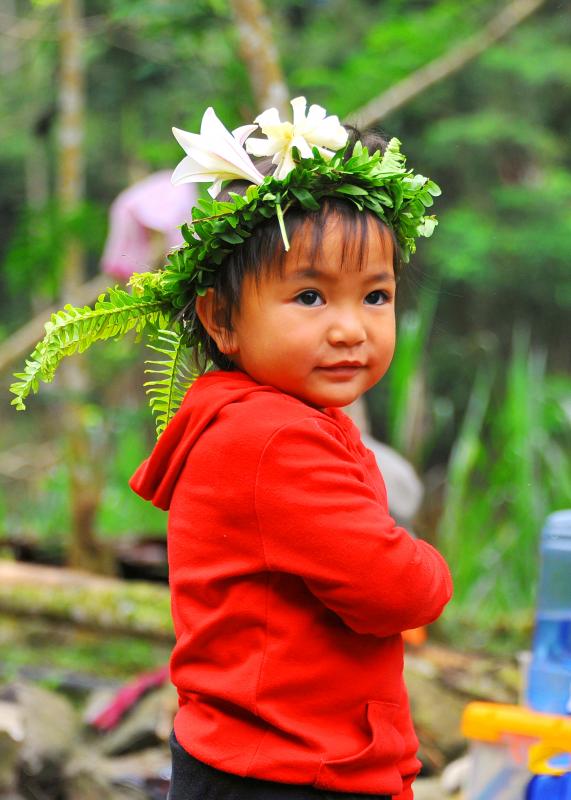
Photo: Han Cheung, Taipei Times
Nikar has come this far after just six months of attending the Luma Association Amis language immersion pinanaman (“learning space”) at the village of Ceroh (Chunrih Township, 春日) in Hualien County. The indigenous tongue has been steadily eroding under centuries of Han Chinese migration and past government policies to promote Mandarin, to the point that even the preschool’s teachers cannot speak it fluently. The 52-year-old Yosifu, for example, can understand it but says he’s only semifluent.
With elders like Kacaw still around to provide their expertise, noted documentary filmmaker and indigenous rights activist Mayaw Biho felt compelled to launch the school in his home village of Ceroh as soon as he could. Relying on private funding, Mayaw started the pinanaman in a one-room building last September. There is no curriculum. The children play games, sing and participate in traditional activities such as foraging and planting.
The crucial objective, Mayaw says, is to let the children feel proud of who they are and where they’re from by learning their own culture in their own language.
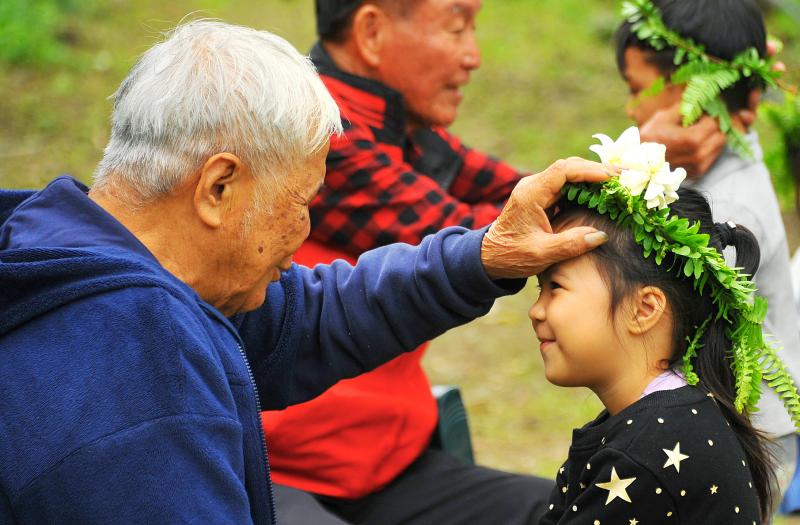
Photo: Han Cheung, Taipei Times
“At this stage, because the children understand Amis, their grandparents and village elders go out of their way to speak to them [in Amis], even if they can only reply in simple phrases,” Mayaw says. “The extra attention makes them feel special, and that is the first step to confidence.”
NO MANDARIN
“Mama,” three-year-old Akay says to her mother who is helping out at the pinanaman. “Ina,” head instructor Panay Arik corrects her with the Amis term. Mayaw believes that community involvement is key to sustaining the school, so while he travels around Taiwan raising funds, day-to-day operations are mostly left to Panay and the parents.
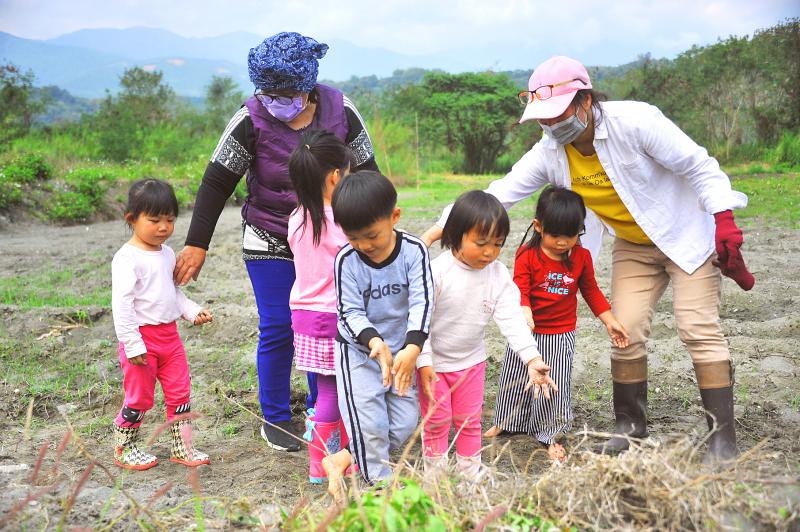
Photo: Han Cheung, Taipei Times
Everyone is used to speaking only in Mandarin, and with six new students and a new teacher joining last month, it is hard to keep conversation completely in Amis. But they try.
Ipik has been training as a teacher under Panay for less than a month. She can conduct a basic conversation in Amis, but like most in her generation, she mostly replied in Mandarin when her parents spoke Amis to her. Her Amis-language competency declined further when she moved to Taoyuan for school and work, only recently returning to take care of her aging father.
Ipik says that if she speaks Mandarin during class she has to buy Panay and the other parents coffee. It’s quite a contrast to the days where children were punished for speaking anything other than Mandarin at school, a policy that began in the 1950s and intensified in the early 1970s. Ipik attended school just after those policies were abolished, but Yosifu remembers them clearly.
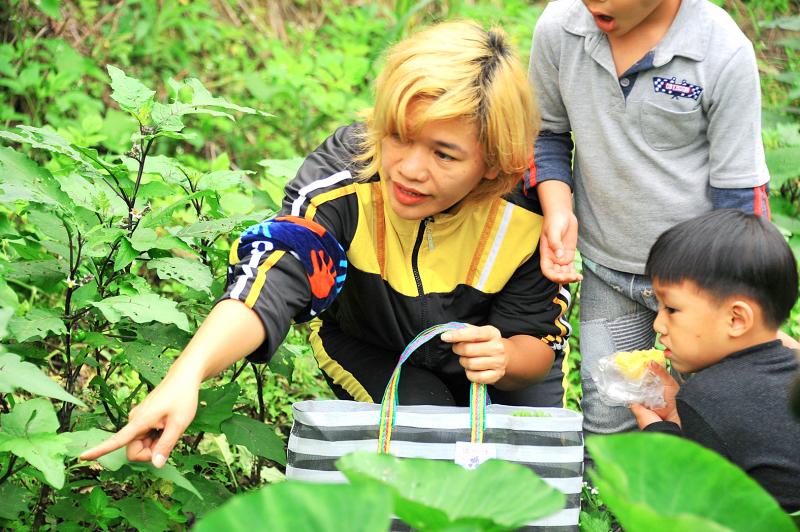
Photo: Han Cheung, Taipei Times
“You owe us a whole bucket of coffee now,” Nikar’s mother Sumay quips. Sumay was a DJ and dancer in the clubs of Taipei when she was young, but she moved home about two years ago to provide Nikar a better environment.
“I’ve been away for so long that my understanding of Amis culture is like that of a child,” she says. “So I’m actually learning with the kids. The more I learn, the more it feels like home here, and the more confident I am to tell people where I’m from.”
Panay is the one speaking the most Amis, doing so consistently with her children outside school hours — but even she says she has much to learn. A certified nurse, Panay didn’t realize the importance of knowing one’s ancestral language until she had trouble communicating with the patients she cared about the most: her grandparents.
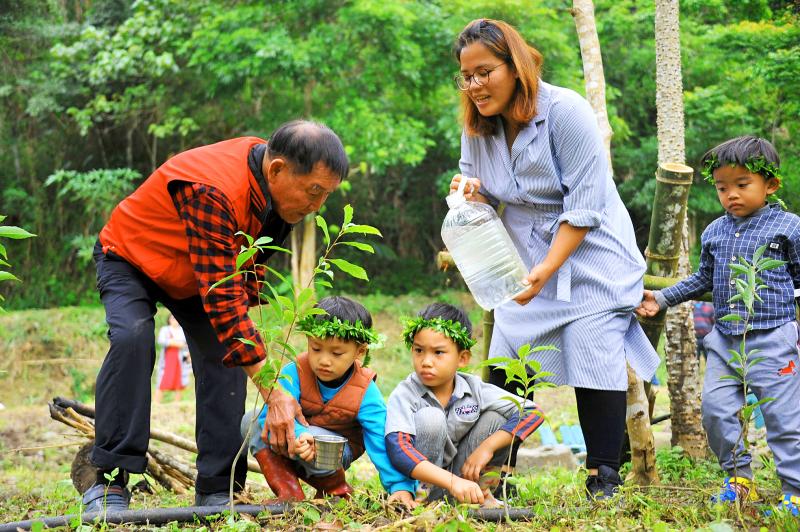
Photo: Han Cheung, Taipei Times
“I couldn’t understand what they wanted and where they were hurting,” she says. “After I had my own children, I didn’t want them to be like me. So I started using my very broken Amis to talk to them.”
Panay became interested in immersion learning after finding that her oldest child could barely speak any Amis despite taking classes at elementary school for three years. One 40-minute class per week is not enough, she says, when the entire environment is otherwise Mandarin speaking. The government didn’t seem interested in addressing the issue when she repeatedly brought it up, so she signed up for Amis classes to do it herself.
Mayaw was about to launch the pinanaman when she moved home, and she quickly signed on as its first teacher.
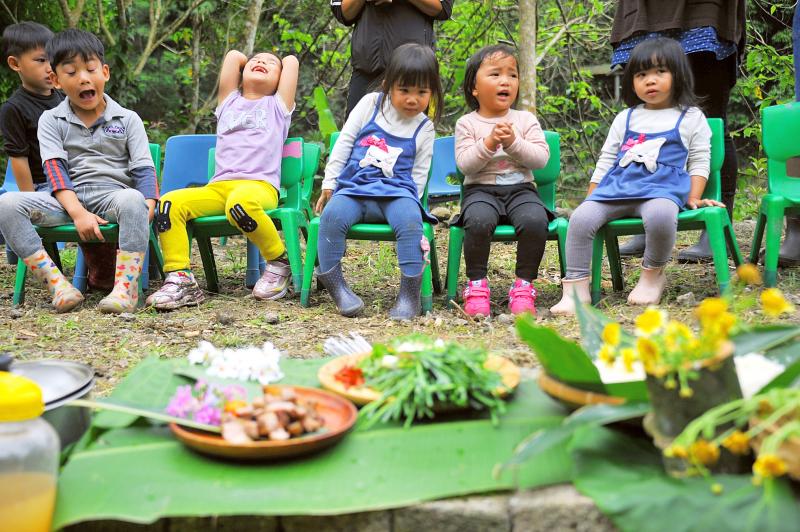
Photo: Han Cheung, Taipei Times
“I feel like my ancestor’s spirits guided me here,” she says. “Originally I just wanted to improve my own Amis and teach my own children, but now I can teach other children too.”
FULL IMMERSION
Last Thursday, the children helped plant Formosa lambsquarters, a kind of grain, in a field near the village before being allowed to run around and play. The day before, they foraged for edible vegetables, planted trees and sang and danced at the school’s opening ceremony while the elders gave each child their blessing.
“We don’t ‘teach’ anything here, we simply let them experience our traditional way of life,” Panay says. “We follow the footsteps of the elders through daily activities and festivals. When they are older we will teach them to swim and identify the flora and fauna in the river, as well as track animals in the mountains.”
“Right now, we just want them to like coming to school,” Mayaw says.
He declined to ask the government for funding in order to do things on his terms. It would take five or six years to meet government qualifications, and by that time the children will have grown up and more elders would have passed, he says. In fact, he wants to demonstrate this immersion learning model to the government and hopes to influence other cultural groups to do the same.
Eventually, however, the children will have to attend elementary school. Mayaw wants his school to serve even the older kids, but that will take a while. Panay says it’s crucial to continue the cultural and language education at home, but most families don’t speak Amis regularly. Some only have one parent who is Amis.
“When we have parent meetings, we urge each other to improve our Amis abilities and use it at home,” she says. “It doesn’t matter if they can’t speak it, they can learn with the children. We need the immersion in Amis to continue at home, otherwise they’ll forget everything after summer vacation.”
Village chief Icyang says that the whole community needs to make an effort to speak more Amis for the language to be truly preserved. It’s a daunting task, but he sounds hopeful after blessing the children at the ceremony.
“We can do it,” he says. “We were able to switch to Mandarin so outsiders could understand us. That means that we are capable of change. We just need to be persistent. Rome wasn’t built in one day.”
For more information, visit: www.luma.land

Taiwan has next to no political engagement in Myanmar, either with the ruling military junta nor the dozens of armed groups who’ve in the last five years taken over around two-thirds of the nation’s territory in a sprawling, patchwork civil war. But early last month, the leader of one relatively minor Burmese revolutionary faction, General Nerdah Bomya, who is also an alleged war criminal, made a low key visit to Taipei, where he met with a member of President William Lai’s (賴清德) staff, a retired Taiwanese military official and several academics. “I feel like Taiwan is a good example of

March 2 to March 8 Gunfire rang out along the shore of the frontline island of Lieyu (烈嶼) on a foggy afternoon on March 7, 1987. By the time it was over, about 20 unarmed Vietnamese refugees — men, women, elderly and children — were dead. They were hastily buried, followed by decades of silence. Months later, opposition politicians and journalists tried to uncover what had happened, but conflicting accounts only deepened the confusion. One version suggested that government troops had mistakenly killed their own operatives attempting to return home from Vietnam. The military maintained that the

Taipei Mayor Chiang Wan-an (蔣萬安) announced last week a city policy to get businesses to reduce working hours to seven hours per day for employees with children 12 and under at home. The city promised to subsidize 80 percent of the employees’ wage loss. Taipei can do this, since the Celestial Dragon Kingdom (天龍國), as it is sardonically known to the denizens of Taiwan’s less fortunate regions, has an outsize grip on the government budget. Like most subsidies, this will likely have little effect on Taiwan’s catastrophic birth rates, though it may be a relief to the shrinking number of

Since its formation almost 15 years ago, Kaohsiung rock band Elephant Gym (大象體操) has shattered every assumption about contemporary popular music, and their story is now on screen in a documentary titled More Real Than Dreams. It’s an unlikely success story that says a lot about young people in Taiwan — and beyond. For a start, their sound is analog. In the film, guitarist Tell Chang (張凱翔) proudly says: “There is no AI in our sound.” His sister, bass player KT Chang (張凱婷) is the true frontwoman — less for her singing abilities than for her thunderous sound on the instrument. Fast like